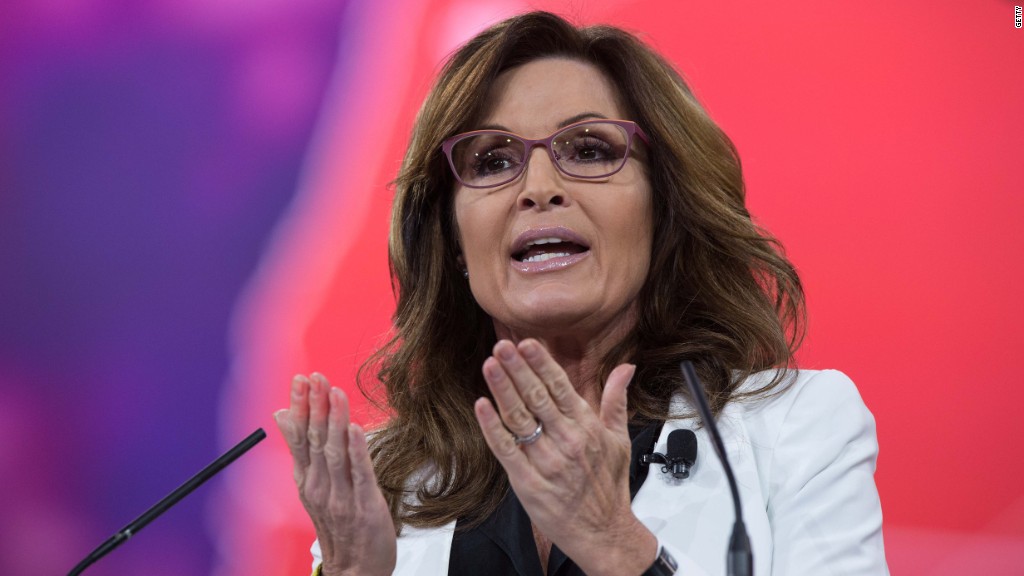
A top editor for the New York Times provided more than an hour of testimony on Wednesday, as a federal judge in Manhattan continues to weigh whether to proceed with Sarah Palin's defamation lawsuit against the newspaper.
Fielding questions from attorneys representing both Palin and his paper, Times editorial page editor James Bennet detailed the writing and research behind a piece that prompted the former Republican vice presidential candidate to take legal action.
Palin is suing the Times over an editorial that ran on June 14 in response to a shooting earlier in the day at a practice for the Congressional baseball game, which left Rep. Steve Scalise (R-LA) severely injured.
The editorial suggested that Jared Lee Loughner, the man who carried out the 2011 shooting in Tucson, Arizona, that killed six people and left former Congresswoman Gabrielle Giffords wounded, was incited by an advertisement distributed by Palin's political action committee. The ad featured a map of the United States showing the districts of several Democratic lawmakers, including Giffords, under crosshairs.
The Times issued a correction the next day noting that the "editorial incorrectly stated that a link existed between political incitement and the 2011 shooting of Representative Gabby Giffords." Palin is seeking at least $75,000 in damages.
In his testimony on Wednesday, Bennet revealed that the first draft of the editorial was written by Elizabeth Williamson, a member of the Times' editorial board who is based in Washington, D.C.
Bennet said that he inserted the offending language during what he described as a significant re-write of Williamson's draft, but he insisted that he did not mean to draw a connection between Palin's map and the Tucson massacre. The map, Bennet said, was simply an example of "rhetoric that contributes to an angry environment."
"I did not intend to imply a causal link to the crime," Bennet said.
Bennet appeared anguished at times during his testimony, as he recounted writing the editorial on a tight deadline. When he saw the criticism piling up on social media shortly before midnight that day, Bennet said he was stunned to see that many readers believed the editorial accused Palin of complicity in the 2011 shooting.
"We didn't mean to communicate that," Bennet said.
The Times has vowed to fight Palin's lawsuit, asserting that Bennet and company made an honest mistake. Palin's lawyers allege that "the Times conduct was committed knowingly, intentionally, willfully, wantonly and maliciously, with the intent to harm Mrs. Palin, or in blatant disregard of the substantial likelihood of causing her harm." They argue that the Times had an economic incentive to bring up Palin in order to drive up page views.
Palin attorney Ken Turkel focused much of his questioning on Bennet's knowledge of the 2011 shooting prior to the publication of the June editorial.
Bennet testified that, when the editorial was written two months ago, he didn't know whether Loughner had seen the map from Palin's PAC, nor was he aware of any reporting indicating that there was no clear link between Loughner and political incitement.
Bennet was also questioned about his brother, Democratic Sen. Michael Bennet, whose office drew threats two days after the Giffords shooting. When Turkel asked if he knew that Palin had once endorsed his brother's opponent in the Colorado senate race, Bennet said he didn't recall but wasn't surprised.
In his probing of Bennet's background at Wednesday's hearing, Turkel ironically invoked one of Palin's fiercest media adversaries, Andrew Sullivan.
Sullivan wrote a blog post in 2011 demanding a correction from the Financial Times after one of its writers accused him of linking the Tucson shooting to "Republican ideology or rhetoric." At the time, Bennet was editor-in-chief of The Atlantic, where Sullivan's now-shuttered blog, "The Daily Dish," was operated.
Bennet testified that he didn't recall that specific post, telling Turkel that Sullivan had complete editorial control over his blog.
Wednesday's hearing was called last week by Judge Jed Rakoff, and it served as a reunion of sorts for lawyers at the center of last year's trial involving the professional wrestler Hulk Hogan and Gawker Media. Turkel represented Hogan, while Times attorney Michael Sullivan argued on behalf of Gawker.
Sullivan, the attorney, was allotted 30 minutes of questioning to open the proceeding, while Turkel had 45 minutes of cross-examination. Rakoff peppered his own questions throughout.
Palin's legal team has subpoenaed the internal communications of 23 Times journalists, including Bennet. The subpoenas were revealed late last month, when the Times filed a motion to dismiss the case.
Rakoff has said he needs Bennet's testimony to help him decide whether to grant the motion, a ruling he will make by the end of the month.


